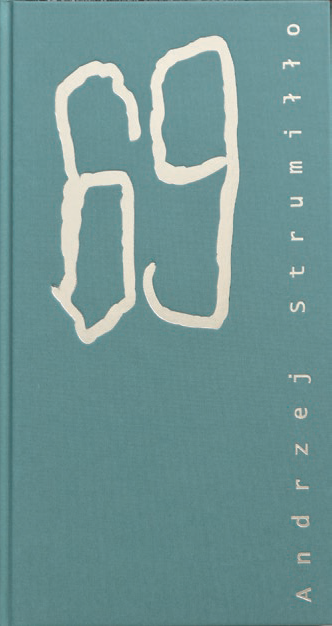A farewell credo and artistic crowning of Strumiłło’s prolific oeuvre

***
I feel time accelerating
The skin of my hands
Resembles ravines
Veins – strong branches
I bend towards earth
I seek a moment and a place
24 August 2016
A Wooden Bird on a Windowsill
Two swans through a window
A day full of clouds
A ring of black on a palette
Today Synaxarium from Mount Athos
Recalls St. Isidore from Pelusium
Who lived on grass and leaves
I lift my brush over the space
Black is my prayer
4 February 2018
***
When I leave
The view through the window will remain
A pair of swans in a bay
A bent tree
Mossy stones
The book of poets and prophets
A spot left by a fly on the window
15 February 2018
***
We march
Each with a sack on our shoulders
With foreign lives in it
Above us banners
And what behind?
A sip of cold tea
Sleepless nights
A trace of breath among clouds
27 March 2017
Awaiting
I lie on a bed by Thuiszorg Groningen
It’s a gift from the rich
Previously used by many
Suffering
Their breath sweat, and urine
Left rusty traces
In solidarity with pain
hospital, Suwałki, 21 March 2017
Translated by Ew a Chrusciel
A farewell credo and artistic crowning of Strumiłło’s prolific oeuvre

Translation rights: Anna Strumiłło, anna.strumiłło@gmail.com
69 is the title of Andrzej Strumiłło’s collection of poems which together with drawings and photographs constitutes an interesting example of correspondence of the arts. Unfortunately, it is the last collection of the author, who passed away in April 2020.
Hence, we can treat 69 as the farewell credo and artistic crowning of his prolific oeuvre.
What is, then, the essence of these final lyrics? They gather over the decades, short reflections about the world, people, and being, which condense spacious concepts and reveal life experience and a stoic containment of language and form. This brevity and spaciousness make Strumiłło’s poems accessible, yet composed of important topics in his existential reflection on reality. In the collection, we find poems posing questions about the first and last cause of being. Reflections on the end of life permeate the poetic tissue of the poems and transpire into an insight about a second dimension.
These poems oscillate between topoi of vanitas; a realistic self-portrait of an old man, and an eschatological vision which expresses his own version of non omnis moriar. Lyrical impressions liberate a subject from rational frames of the world, forming the allegory of human life with a subtle metaphysical note. Strumiłło’s work demonstrates that cognitive synthesis is possible and most effective in old age, thus superseding a contemporary understanding of the world. It gives the reader a voice which is hard to find within herself.
Tomasz Pyzik
Translated by Ewa Chrusciel
Selected samples
She climbed her first peaks in a headscarf at a time when women in the mountains were treated by climbers as an additional backpack. It was with her that female alpinism began! She gained recognition in a spectacular way. The path was considered a crossing for madmen. Especially since the tragic accident in 1929, preserved … Continue reading “Halina”
First, Marysia, a student of an exclusive private school in Warsaw’s Mokotów district, dies under the wheels of a train. Her teacher, Elżbieta, tries to find out what really happened. She starts a private investigation only soon to perish herself. But her body disappears, and the only people who have seen anything are Gniewomir, a … Continue reading “Wound”
A young girl, Regina Wieczorek, was found dead on the beach. She was nineteen years old and had no enemies. Fortunately, the culprit was quickly found. At least, that’s what the militia think. Meanwhile, one day in November, Jan Kowalski appears at the police station. He claims to have killed not only Regina but also … Continue reading “Penance”
The year is 1922. A dangerous time of breakthrough. In the Eastern Borderlands of the Republic of Poland, Bolshevik gangs sow terror, leaving behind the corpses of men and disgraced women. A ruthless secret intelligence race takes place between the Lviv-Warsaw-Free City of Gdańsk line. Lviv investigator Edward Popielski, called Łysy (“Hairless”), receives an offer … Continue reading “A Girl with Four Fingers”
This question is closely related to the next one, namely: if any goal exists, does life lead us to that goal in an orderly manner? In other words, is everything that happens to us just a set of chaotic events that, combined together, do not form a whole? To understand how the concept of providence … Continue reading “Order and Love”
The work of Józef Łobodowski (1909-1988) – a remarkable poet, prose writer, and translator, who spent most of his life in exile – is slowly being revived in Poland. Łobodowski’s brilliant three- volume novel, composed on an epic scale, concerns the fate of families and orphans unmoored by the Bolshevik Revolution and civil war and … Continue reading “Ukrainian Trilogy: Thickets, The Settlement, The Way Back”























































































































































































































































































